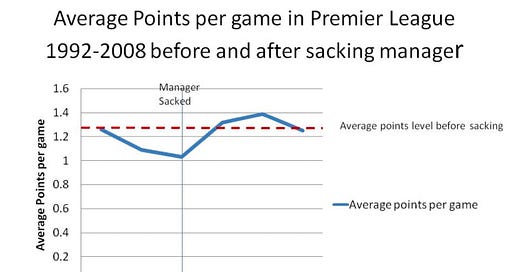There are often good reasons to sack your manager, but most of the time it won't help
West Ham and Everton are just two of the clubs with their fingers crossed for a "new manager bounce" but years of data show that improvement is far from guaranteed.
Do you think you can forecast some of the events that will unfold in the world of sport in 2025? If so, and you’re interested in the possibility of a cash prize, signed books and a free subscription to all the content on this site, for as long as it exists, then enter the quiz that appeared in this post from 3 January. Tomorrow is the deadline for entries.
As Graham Potter prepares to oversee his first Premier League game as West Ham’s manager against Fulham this evening, and as David Moyes looks forward to returning to PL management with Everton against Aston Villa tomorrow, today’s analysis will address whether sacking a failing boss makes any difference.
Potter is succeeding Julen Lopetegui at the London Stadium and Moyes is filling the shoes of Sean Dyche, axed by Everton’s new owners, the Friedkin Group. Both of their new employers will have made the switch believing a new man can make a tangible difference to results.
The reality is that at most clubs, most of the time, changing manager doesn’t make a massive difference. That’s what lots of data from lots of leagues in lots of countries, over lots of years, tells us.
That doesn’t mean that there aren’t sometimes good reasons to get rid of a manager who is failing or who is appearing to fail. Fans get upset. Owners are influenced by fans. Pressure builds when losing runs continue. The media build narratives that aren’t necessarily helpful. Sometimes even players and agents agitate for change.
It’s also not the case that new managers always fail. Sometimes a new inspirational figure will transform the fortunes of a club. Think of Pep Guardiola everywhere he’s been. Think of Mauricio Pochettino replacing the perfectly adequate Nigel Adkins at Southampton in 2013. Think of umpteen examples at the clubs that you and your friends support.
Yet it’s the results of the exceptional managers that drive the behaviour of owners; it’s the belief that their club will finally get it right.
Brilliant managers do emerge now and then. But, generally, after a while, even with a bounce, results will tend to drift back to where they were before the change.
Today’s piece considers all of this, and more, including average points tallies over six games that place a manager in danger; why a goal is often worth a point; the “typical” period it takes to go from a slump to the sack and then a bounce and back; plus examples of what’s happening right now at selected clubs in England and Scotland who have recently sacked a manager.
We’ll start with a well-known study - wel- known in academic and football circles at least - about Premier League sackings.




